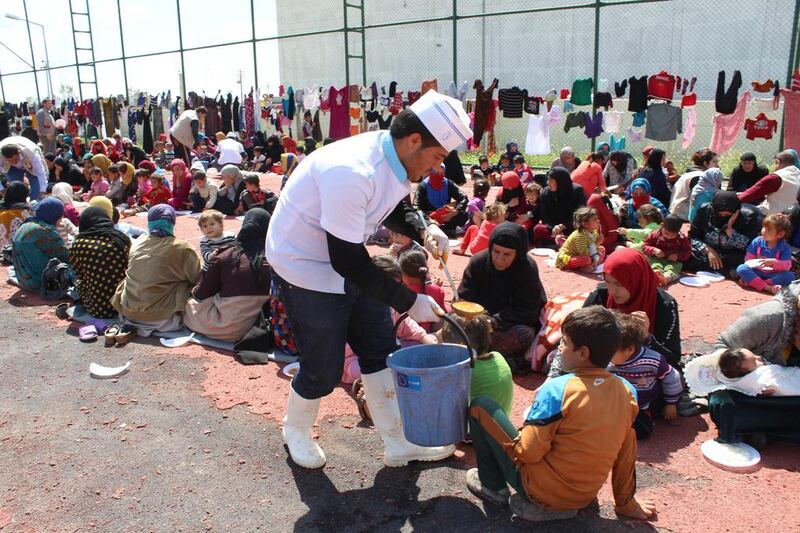MAKHMOUR, IRAQ // More than a million Iraqis could be forced to flee their homes if the military campaign to retake Mosul from ISIL continues to falter, aid officials say.
A limited offensive launched from Makhmour, billed as the first phase of the campaign, stalled almost as soon as it began on March 24, highlighting once more the poor fighting capabilities of the Iraqi army and causing local Arab villagers to seek safety in the Kurdish-held town in northern Iraq, about 75 kilometres from Mosul.
About 1,900 men, women and children have made their way to Makhmour to escape the fighting so far. They barely register among the 3.3 million Iraqis who have been forced from their homes since ISIL took over vast swathes of the country in 2014, but the trickle of people could soon swell into a human tidal wave.
Lise Grande, the UN humanitarian coordinator for Iraq, said more than a million people could flee the battle for Mosul, Iraq’s second largest city which the government is determined to retake from ISIL this year.
“In the worst case scenario, we are looking at the largest population displacement worldwide this year,” said Mrs Grande.
Aid officials say the speed of the advance is crucial – should the army struggle like it did during its campaign to retake Ramadi, the scale of displacement would be higher. When Ramadi was finally retaken by elite Iraqi army units last December after eight months of fighting, most residents had fled and the city was in ruins. By contrast, the ongoing offensive to retake the city of Hit is progressing more swiftly, which limits the displacement.
Given the importance of speed to contain the humanitarian fallout, aid agencies will be alarmed by the slow progress made by the Iraqi army out of Makhmour.
So far, the army has managed to take only three villages, two of which were not contested by ISIL, according to Najat Ali, the sector commander of Kurdish forces at Makhmour. The Iraqis quickly became bogged down elsewhere, and have not managed to take the village of Nasr in a week of fighting.
Reinforcements are reportedly on the way to help the struggling 15th Army division that has been tasked to take Qayarrah, the town that is to be used as a staging post for the attack on Mosul itself. But the problem is not one of manpower or materiel, it is the lack of morale and seemingly total absence of military competence.
“We expected the Iraqi army to be bad, but not this bad. These guys are really bad,” said Colonel Waya Aziz, who commands a unit of Kurdish peshmerga holding the front at Nasr.
The villagers who fled to Makhmour are equally unimpressed by their liberators.
“From what we saw, I don’t think Mosul will be liberated,” said Ibrahim, 23, a student from Kharbadan, the only village that was taken in combat.
“When we first saw the Iraqi army we were happy to see them. But when we put out the white flag they started shooting aimlessly. They even destroyed my car after they had taken the village.”
Should a drawn-out battle for Mosul cause the UN’s worst-case scenario to come true, the consequences would be dire. Aid agencies are already struggling to deal with the current size of the displaced population, which keeps on growing as the Iraqi army and allied Shiite militias challenge ISIL’s hold over Anbar province.
Fifty thousand people are estimated to have fled Hit from the beginning of the year until March 20, according to the Norwegian Refugee Council. As many more are expected leave as the fighting continues.
Meanwhile, the Mosul campaign will begin to displace an increasing amount of Iraqis. Between 25,000 to 30,000 people could be displaced by the advance to Qayarrah alone, estimates Rizgar Obeid, a supervisor at the Kurdish Barzani Charity Foundation that is leading the relief effort at Makhmour. Another 20,000 people are expected to flee Qayarrah itself.
The Kurdistan Regional Government (KRG) could become a stumbling block towards accommodating another surge in displacement. The autonomous Kurdish region has taken in 1.3 million displaced Iraqis, mainly Arabs, on top of more than 200,000 Syrian refugees, and is struggling to cope with the influx.
The World Bank estimates that the displacement crisis cost the Kurdish economy US$1.4 billion (Dh5.14bn) in 2015. In the midst of a severe economic crisis, and by its own account $16bn in debt, the KRG is hesitant to increase the burden on its economy.
With a population of around 5 million, the vast majority of whom are Kurdish, the KRG is also wary of a de facto Arabisation that may affect its aspirations for independence from Iraq.
Security is also a concern, and the Kurds have been careful to screen the recent batch of arrivals at Makhmour. “These people have lived under ISIS control willingly for two years, and its possible that some of these people still have close ties with ISIS,” said Mr Ali.
The villagers now in Makhmour claim they are opposed to the terror group and that ISIL had prevented them from leaving the territory under its control.
Kurdish officials have objected to taking in any more displaced Arabs, which would force aid agencies to deliver help in less secure and accessible parts of the country, or watch helplessly as people are stranded between the fighting in Mosul and the nearby internal border with the KRG.
It is more likely, however, that the Kurds will relent and allow at least part of the stream of displaced people on to its territory.
“We are expecting the people on this side of the Tigris to come to the KRG. Three camps are under construction,” said Mr Obeid. “We will open the door to the people of Mosul.”
foreign.desk@thenational





